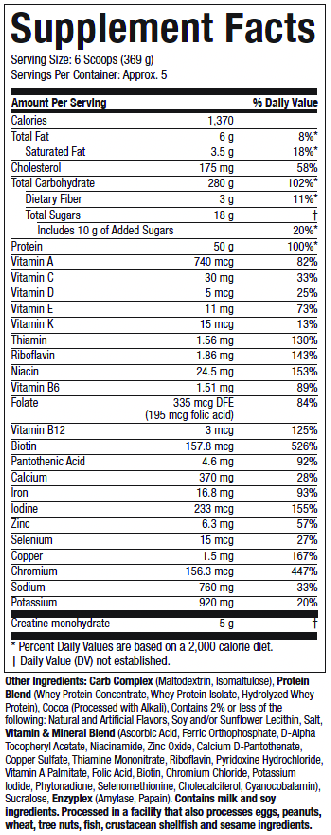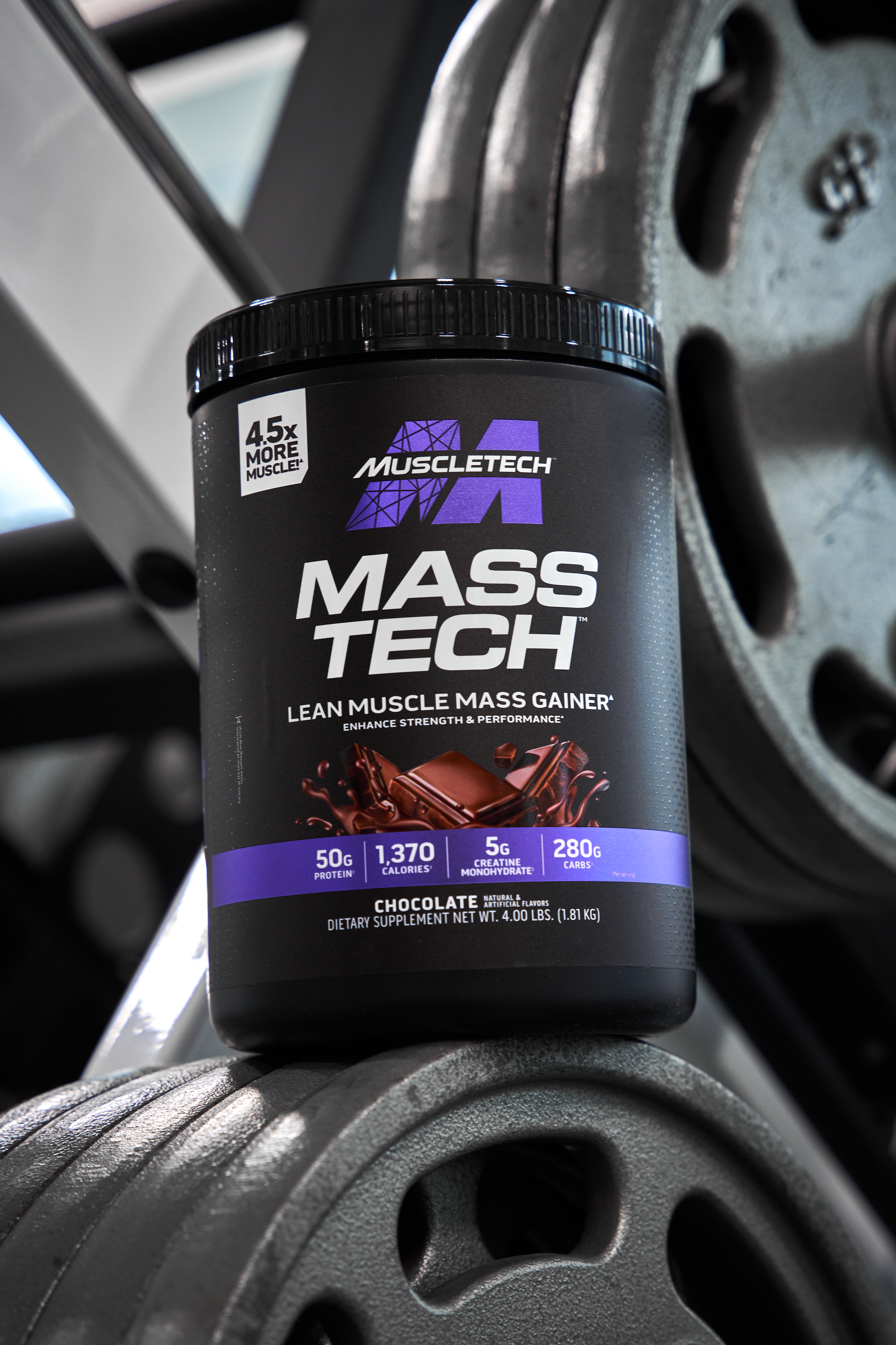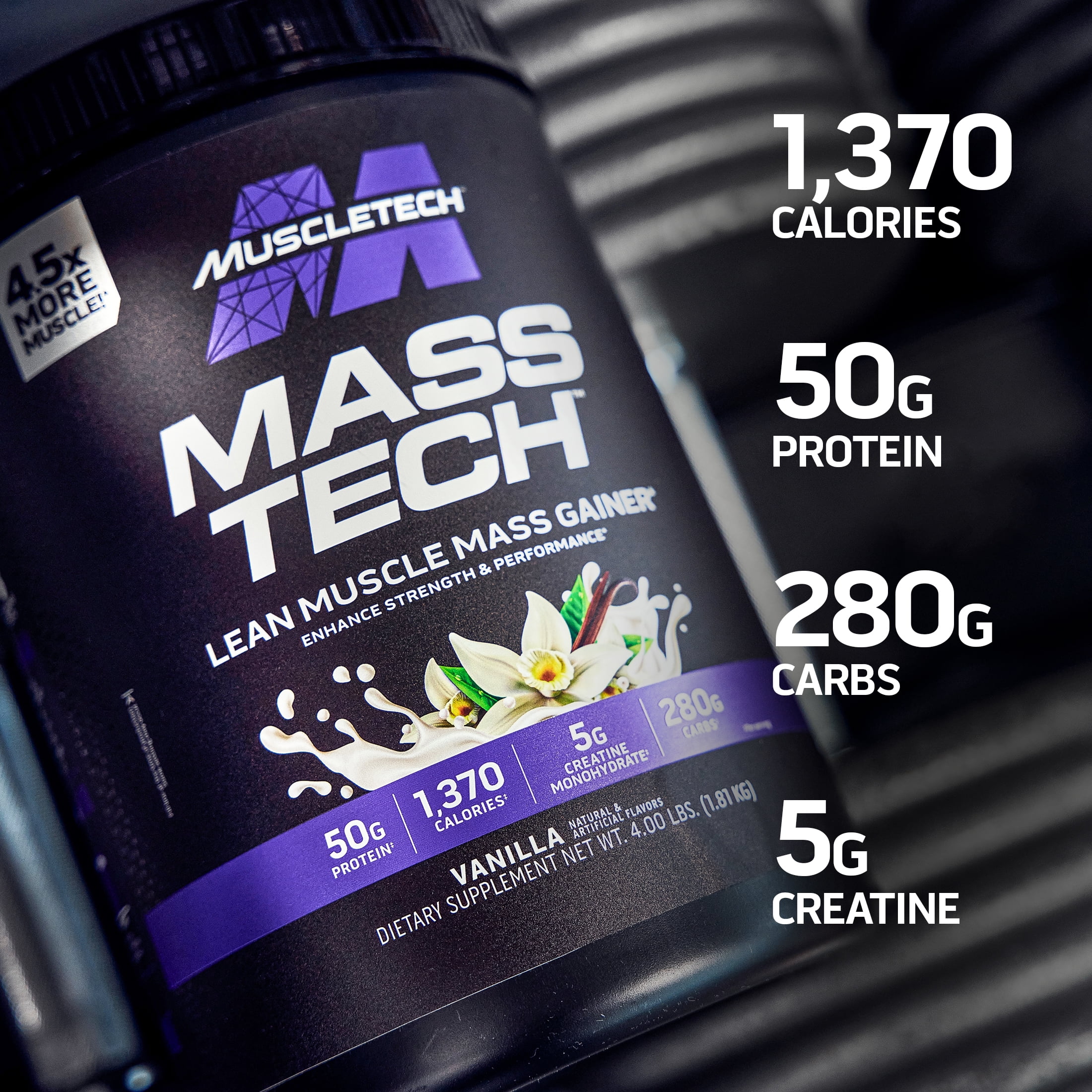There are hundreds – perhaps even thousands – of brands in the supplement industry. Most of them have a catalog of white-labeled products that aren't very dissimilar from everything else on the market.
The story at MuscleTech is different. They go above and beyond to deliver not just incredible flavors, but they also pioneer new ingredients like paraxanthine and dileucine, which we discussed with Raza Bashir and Shawn Wells on Episode #123 of the PricePlow Podcast.
Not everything needs to be absolutely bleeding edge, however. Sometimes, it's just nice to start buying one of your standard products from reputable brands like MuscleTech that take a keen interest in quality and flavor.
MuscleTech Mass-Tech: Pack on the Pounds
Mass gainers are not new. For decades, hardgainers across the world have been trying anything and everything to pack down enough calories to put on some muscle. In response to this need, mass gainers hit the market. Gainers often clock in at over 1000 calories per serving, making it a breeze to make sure you're hitting your intake goals.
MuscleTech's new gainer is called Mass-Tech, and with an eye-boggling 280g of carbs and 5g of protein, it boasts an enormous 1,370 calories per serving.
We're going to dive into how MuscleTech Mass-Tech works, but first, let's check PricePlow for good MuscleTech deals, and check out our video review of the product:
MuscleTech Mass-Tech Lean Muscle Mass Gainer – Deals and Price Drop Alerts
Get Price Alerts
No spam, no scams.
Disclosure: PricePlow relies on pricing from stores with which we have a business relationship. We work hard to keep pricing current, but you may find a better offer.
Posts are sponsored in part by the retailers and/or brands listed on this page.
This area is reserved for Team PricePlow's upcoming videos.
Subscribe to our channel and sign up for notifications so you catch it when it goes live!
MuscleTech Mass-Tech – Nutrition Facts
Each 6 scoop (369g) serving of Mass-Tech contains the following ingredient profile:
Macros
-
Calories: 1,370
-
Total Fat: 6g
-
Saturated Fat: 3.5g
-
-
Total Carb: 280g
-
Dietary Fiber: 3g
-
Total Sugars: 18g
-
Added Sugars: 10g
-
-
-
Protein: 50g
Micros
- Vitamin A – 740mcg (82% DV)
- Vitamin C – 30mg (33% DV)
- Vitamin D – 5mcg (25% DV)
- Vitamin E – 11mg (73% DV)
- Vitamin K – 15mcg (13% DV)
- Thiamin – 1.56mg (130% DV)
- Riboflavin – 1.86mg (143% DV)
- Niacin – 24.5mg (153% DV)
- Vitamin B6 – 1.51mg (89% DV)
- Folate – 335mcg (84% DV)
- Vitamin B12 – 3mcg (125% DV)
- Biotin – 157.8mcg (526% DV)
- Pantothenic Acid – 4.6mg (92% DV)
- Calcium – 370mg (28% DV)
- Iron – 16.8mg (93% DV)
- Iodine – 233mcg (155% DV)
- Zinc – 6.3mg (57% DV)
- Selenium – 15mcg (27% DV)
- Copper – 1.5mg (167% DV)
- Chromium – 156.3mcg (447% DV)
- Sodium – 760mg (33% DV)
- Potassium – 920mg (20% DV)
MuscleTech Mass-Tech Ingredients
-
Carb Complex
The "bulk" of the calories in Mass-Tech come from its carbohydrate blend, which contains two sources of carbs: maltodextrin and isomaltulose. All told, there are a whopping 280g of carbs in each serving, which will be sure to help you pack on those stubborn pounds.
The combination of maltodextrin and isomaltulose helps to smooth the insulin spike typical of carbohydrate consumption. Whereas maltodextrin is a high glycemic index (GI) carb source, isomaltulose provides a counterbalance due to its low GI score. According to one study, isomaltulose ingestion led to lower baseline postprandial glucose concentrations and insulin compared to maltodextrin and glucose.[1] As a result, the addition of isomaltulose to the Mass-Tech formula will help to decrease the overall glycemic load, thereby mitigating some of the undesirable downstream effects of overstimulated insulin spikes.
-
Protein Complex
While the majority of the calories in Mass-Tech come from carbs, there are 50 grams of protein per serving, which is nothing to sneeze at.
The protein blend in Mass-Tech is derived from three sources: whey protein concentrate, whey protein isolate, and hydrolyzed whey protein. Whey protein is derived from bovine dairy, and represents one of the best sources of protein that money can buy. It's a complete protein, meaning it contains all nine essential amino acids that the body needs to repair itself effectively and that it cannot produce on its own.[2] Whey protein concentrate is a slightly less purified form of whey, weighing in at anywhere from 35-80% protein. Whey protein isolate, on the other hand, is highly purified, with its protein content ranging at 90% or more.
Whey protein has been shown through research to stimulate both strength and muscle gains, making it an excellent tool for performance and body recomposition.[2-4]
-
Creatine
For readers of PricePlow, creatine hardly needs an introduction. It is one of the most popular ingredients in the supplement industry due to its wide variety of studied benefits, ranging from increasing power,[5,6] speed,[7-9] hydration,[10] and testosterone,[11-15] to boosting mood,[16-18] and lean mass gain.[19-22]
All MuscleTech Mass-Tech flavors
Check out our up-to-date list of Mass-Tech flavors below:
The answer for hardgainers
For those who struggle to gain weight, it can be difficult to wolf down the number of calories required to put on mass. This is particularly difficult if you're trying to eat clean and avoid some of the "dirtier" foods like doughnuts and pizza.
For athletes like that, a good mass gainer shake is the answer. Mass-Tech is made with a solid list of ingredients, and even contains a healthy proportion of the vitamins and minerals you need on a daily basis to ensure your body is operating at peak capacity.
Even better, the recommended daily 5 gram dose of creatine is included, so no need to buy a separate powder!
MuscleTech Mass-Tech Lean Muscle Mass Gainer – Deals and Price Drop Alerts
Get Price Alerts
No spam, no scams.
Disclosure: PricePlow relies on pricing from stores with which we have a business relationship. We work hard to keep pricing current, but you may find a better offer.
Posts are sponsored in part by the retailers and/or brands listed on this page.






Comments and Discussion (Powered by the PricePlow Forum)